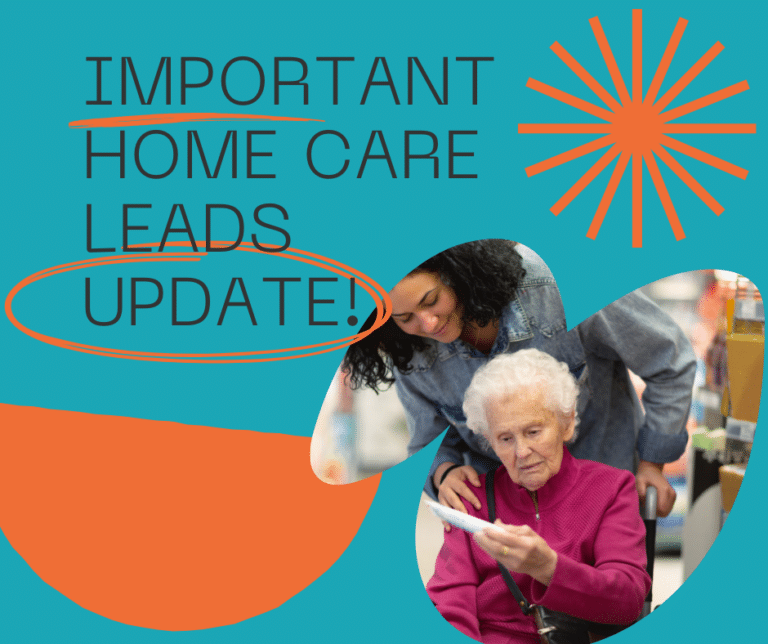Table of Contents
ToggleHome Care Lead Buying News
If you buy home care leads from the usual suspects, changes are coming! My guess is that pricing will change….
And, by the way, if you didn’t already know this, the following websites are all owned by the same company- you guessed it, A Place for Mom.
APFM owns the following lead-generation websites:
- www.assistedliving.com
- www.alzheimers.net
- www.nursinghomes.com
- www.agingcare.com
- www.veteranaid.org
- www.senioradvisor.com
- www.caregivers.com
Don’t be confused- you are almost always buying your leads from the same company.
Who is not in that group?
Caring.com, Careinhomes.com, and maybe a few others.
Why Are We Sharing This Information Now?
Approved Senior Network® has been helping home care agencies with their online and in-person marketing for 16 years!
We encourage you to make marketing decisions that best meet your financial goals. If buying leads is your thing, go for it!
Consider this: Having a lead-generating home care website of your own, that is visible in your local market, and gets the right consent from consumers is a must.
If you currently have an old, outdated, or slow rendering site that does not generate leads, talk to us.
Your own “home care lead machine” is what you need to grow your home care business. Talk to us today.
The FCC Decision
On December 13, 2023, the Federal Communications Commission (FCC) made a groundbreaking decision with a 4-1 vote to implement new regulations aimed at eliminating the widespread issue of unwanted robocalls and robotexts through what’s known as the lead generator loophole.
This move signifies a major shift in how companies can gather and use consumer information for marketing.
Following this, on December 18, 2023, the FCC unveiled a comprehensive report along with a set of proposed rules and a waiver order. These documents collectively target the loophole by insisting that companies must now get clear, written permission from individuals before sending them marketing calls or texts, and this permission must be specific to each seller.
The updated rules introduce measures to combat robotexts by allowing for the blocking of numbers flagged for suspicious activity. They also make it clear that companies must now follow a strict opt-in policy for sending texts derived from emails
Understanding the New Regulations
Traditionally, lead generation has been a crucial strategy for businesses to reach potential customers, especially online. The digital era has made it easier for companies to target and connect with interested consumers through various online platforms.
These platforms enable people to compare prices for services like insurance or travel deals by submitting their information and receiving quotes from different providers.
However, the new FCC rules are set to change the game. They require that any consent for marketing calls or texts must be explicitly given to one seller at a time. This approach is designed to cut down on the barrage of unwanted communications that consumers often complain about.
Now, consent must be specific and directly related to the service or product the consumer showed interest in, preventing companies from sharing consumer information with multiple partners.
Key Features of the FCC’s New Approach
Individualized Consent: The FCC now mandates that consent must be obtained for each seller individually, putting an end to the practice of hidden or unclear consent forms.
Web Page Consent: While a webpage can feature multiple sellers, each must secure consent separately, ensuring transparency and specificity.
Relevance of Communication: Any communication must be directly related to the context in which the consumer gave their consent, aligning with their expectations.
Extension of Do Not Call Protections: The new rules extend the protections of the National Do Not Call Registry to include text messages, requiring explicit consent for marketing texts.
Addressing Text Message Blocking: The FCC introduces guidelines for wireless providers to block texts identified as illegal, ensuring consumer protection.
Implications for Businesses
Businesses that rely on lead generation will need to adjust their practices significantly. The requirement for individualized consent means that companies must be more transparent and direct in how they obtain permission from consumers. This could involve creating clearer consent forms or direct links to consent pages for specific sellers.
For lead generators, the shift means rethinking how they collect and share consumer information. The emphasis on relevance and specificity in consent could challenge existing practices, requiring new strategies to ensure compliance.
Advertisers partnering with lead generators also face new challenges. They must verify that the consent they have is in line with the new regulations, potentially revisiting current leads to ensure they meet the updated standards.
Conclusion
The FCC’s new rules represent a significant shift in the landscape of digital marketing and lead generation. By requiring more specific and individualized consent, the FCC aims to protect consumers from unwanted communications while still allowing businesses to reach potential customers. Companies will need to adapt quickly to these changes, reevaluating their lead generation and marketing strategies to ensure compliance and maintain effective customer outreach.
Valerie VanBooven RN, BSN founded the company after years of working in many different roles from ICU Nurse to Discharge Planner, Home Care, Care Management and more. She wrote her first book in 2003, called “Aging Answers”. After that came “The Senior Solution” in 2009.
Valerie and her staff grew as more home care agencies and senior service businesses realized the undeniable value of being found online.


